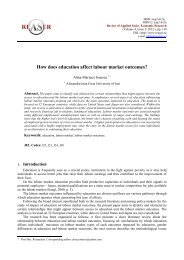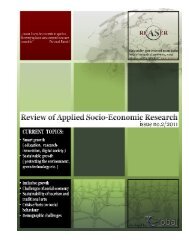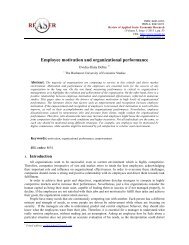Volume 3, ISSUE1/2012 - Review of Applied Socio-Economic ...
Volume 3, ISSUE1/2012 - Review of Applied Socio-Economic ...
Volume 3, ISSUE1/2012 - Review of Applied Socio-Economic ...
You also want an ePaper? Increase the reach of your titles
YUMPU automatically turns print PDFs into web optimized ePapers that Google loves.
ISSN: 2247-6172<br />
ISSN-L: 2247-6172<br />
<strong>Review</strong> <strong>of</strong> <strong>Applied</strong> <strong>Socio</strong>- <strong>Economic</strong> Research<br />
(<strong>Volume</strong> 3, Issue 1/ <strong>2012</strong> ), pp. xxx-xxx<br />
URL: http://www.reaser.eu<br />
e-mail: editors@reaser.eu<br />
Tax incentives, discriminatory factor prices and the regional economic<br />
problem: the case <strong>of</strong> Greece<br />
Thomas A. Anastassiou 1+<br />
1 Department <strong>of</strong> Business Administration, Athens University <strong>of</strong> <strong>Economic</strong>s and Business, Greece<br />
Abstract: In this article an appraisal <strong>of</strong> the Greek regional incentive provisions enacted in the past is<br />
attempted. At a first stage, the exposition <strong>of</strong> some theoretical arguments, that should be followed in the<br />
planning <strong>of</strong> every regional incentive process, and which are very well founded, is given. These theoretical<br />
arguments are derived from a geometric and algebraic exposition <strong>of</strong> the regional problem. At a second stage,<br />
the Greek regional incentive structure is reviewed to see whether it was in accordance with the powerful<br />
theoretical arguments presented. It was shown that no proper consideration was given to the importance <strong>of</strong><br />
labor subsidies as a means for the solution <strong>of</strong> the regional unemployment problem, while capital cost<br />
differentials existed to an extensive degree. A shift <strong>of</strong> investment then to developing areas was found, which<br />
could have contributed to the provision <strong>of</strong> regional investment subsidies. But it was indicated that capital<br />
intensive industries were those that had caused the shift and thus investment incentive provisions did not<br />
succeed in resolving the regional unemployment problem.<br />
Key words: tax incentives, regional economics, discriminatory factor prices<br />
JEL codes: R58<br />
1. Introduction<br />
Discriminatory factor taxation within the same geographical region, but among various industries or<br />
even among firms in the same industry, has been shown (Anastassiou, [2]) to exercise its effects on the<br />
economy’s total output. Using general equilibrium analysis <strong>of</strong> production and exchange it was indicated that<br />
national output was caused to be at lower levels than the production possibilities <strong>of</strong> the economy, and this<br />
was also manifested for the Greek case. If one wants to analyze the effects <strong>of</strong> discriminatory factor prices,<br />
but now at a regional level, one has to consider the specific characteristics <strong>of</strong> the regional problem. These<br />
characteristics are mainly two. Firstly, that the existence <strong>of</strong> national wage bargaining imposes fixed wage<br />
rates that are faced by all firms. Secondly, one <strong>of</strong> the two main factors <strong>of</strong> production, namely labor, is taken<br />
to be immobile between various regions.<br />
The first characteristic is mainly derived from casual empiricism (Archibald, [4]) and it can be<br />
explained only by the existence <strong>of</strong> a certain degree <strong>of</strong> labor market imperfection. It is national wage<br />
bargaining that imposes higher rates than the opportunity cost <strong>of</strong> labor that can be found in various areas<br />
+ Corresponding author: Thomas A. Anastassiou<br />
37 Tinou Street,<br />
Ag.Paraskevi, ATHENS 153 43<br />
GREECE<br />
e-mail: anastassiou@aueb.gr<br />
1








